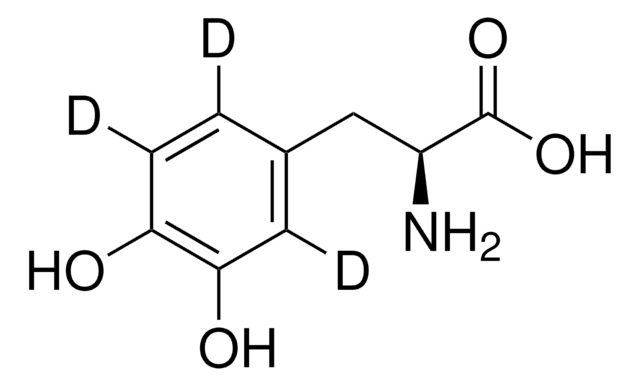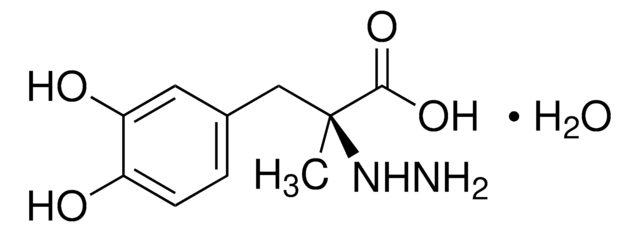Wichtige Dokumente
L0400000
Levodopa
European Pharmacopoeia (EP) Reference Standard
Synonym(e):
3,4-Dihydroxy-L-Phenylalanin, 3-(3,4-Dihydroxyphenyl)-L-alanin, L-3-Hydroxytyrosin, L-DOPA, Levodopa
About This Item
Empfohlene Produkte
Qualität
pharmaceutical primary standard
API-Familie
levodopa
Hersteller/Markenname
EDQM
mp (Schmelzpunkt)
276-278 °C (lit.)
Anwendung(en)
pharmaceutical (small molecule)
Format
neat
Lagertemp.
2-8°C
SMILES String
N[C@@H](Cc1ccc(O)c(O)c1)C(O)=O
InChI
1S/C9H11NO4/c10-6(9(13)14)3-5-1-2-7(11)8(12)4-5/h1-2,4,6,11-12H,3,10H2,(H,13,14)/t6-/m0/s1
InChIKey
WTDRDQBEARUVNC-LURJTMIESA-N
Angaben zum Gen
human ... DRD3(1814)
Suchen Sie nach ähnlichen Produkten? Aufrufen Leitfaden zum Produktvergleich
Allgemeine Beschreibung
Anwendung
Verpackung
Sonstige Hinweise
Ähnliches Produkt
Signalwort
Warning
H-Sätze
Gefahreneinstufungen
Acute Tox. 4 Oral - Eye Irrit. 2 - Skin Irrit. 2 - STOT SE 3
Zielorgane
Respiratory system
Lagerklassenschlüssel
11 - Combustible Solids
WGK
WGK 3
Hier finden Sie alle aktuellen Versionen:
Analysenzertifikate (COA)
Leider sind derzeit keine COAs für dieses Produkt online verfügbar.
Wenn Sie Hilfe benötigen, wenden Sie sich bitte an Kundensupport
Besitzen Sie dieses Produkt bereits?
In der Dokumentenbibliothek finden Sie die Dokumentation zu den Produkten, die Sie kürzlich erworben haben.
Kunden haben sich ebenfalls angesehen
Unser Team von Wissenschaftlern verfügt über Erfahrung in allen Forschungsbereichen einschließlich Life Science, Materialwissenschaften, chemischer Synthese, Chromatographie, Analytik und vielen mehr..
Setzen Sie sich mit dem technischen Dienst in Verbindung.







